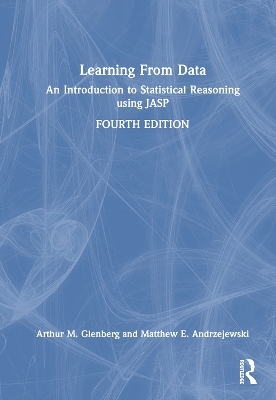
Learning From Data
Routledge (Verlag)
978-0-367-45798-3 (ISBN)
This fully updated fourth edition explores the foundations of statistical reasoning, focusing on how to interpret psychological data and statistical results. This edition includes three important new features. First, the book is closely integrated with the free statistical analysis program JASP. Thus, students learn how to use JASP to help with tasks such as constructing grouped frequency distributions, making violin plots, conducting inferential statistical tests, and creating confidence intervals. Second, reflecting the growing use of Bayesian analyses in the professional literature, this edition includes a chapter with an introduction to Bayesian statistics (also using JASP). Third, the revised text incorporates adjunct questions, that is, questions that challenge the student’s understanding, after each major section. Cognitive psychology has demonstrated how adjunct questions and related techniques such as self-explanation can greatly improve comprehension.
Additional key features of the book include:
• A user-friendly approach, with focused attention to explaining the more difficult concepts and the logic behind them. End of chapter tables summarize the hypothesis testing procedures introduced, and exercises support information recall and application.
• The consistent use of a six-step procedure for all hypothesis tests that captures the logic of statistical inference.
• Multiple examples of each of the major inferential statistical tests.
• Boxed media reports illustrate key concepts and their relevance to real-world issues.
• A focus on power, with a separate chapter, and power analysis procedures in each chapter.
With comprehensive digital resources, including large data sets integrated throughout the textbook, and files for conducting analysis in JASP, this is an essential text for undergraduate or beginning graduate statistics courses in psychology, education, and other applied social and health sciences.
Arthur M. Glenberg is an emeritus Professor of Psychology at Arizona State University and at the University of Wisconsin–Madison. He is a Mercator Fellow at the University of Tübingen in Germany, and he holds an appointment at INICO at the University of Salamanca in Spain. He received his Ph.D. in 1974 from the University of Michigan. Matthew E. Andrzejewski is a lecturer in the Department of Psychology at the University of Wisconsin–Whitewater. He received his Ph.D. in 2001 from Temple University.
01. Why Statistics? 02. Frequency Distributions and Percentiles 03. Central Tendency and Variability 04. z Scores and Normal Distributions 05. Overview of Inferential Statistics 06. Probability 07. Sampling Distributions 08. Logic of Hypothesis Testing 09. Power 10. Logic of Parameter Estimation 11. Inferences About Population Proportions Using the z Statistic 12. Inferences About μ When σ Is Unknown: The Single-sample t Test 13. Comparing Two Populations: Independent Samples 14. Random Sampling, Random Assignment, and Causality 15. Comparing Two Populations: Dependent Samples 16. Comparing Two Population Means: The Independent Sample ANOVA 17. One-Factor ANOVA for Dependent Samples 18. Introduction to Factorial Designs 19. Describing Linear Relationships: Regression 20. Measuring the Strength of Linear Relationships: Correlation 21. Inferences From Nominal Data: The χ2 Statistic 22. Introduction to Bayesian Statistics
| Erscheinungsdatum | 10.07.2024 |
|---|---|
| Zusatzinfo | 41 Tables, black and white; 85 Line drawings, black and white; 35 Halftones, black and white; 120 Illustrations, black and white |
| Verlagsort | London |
| Sprache | englisch |
| Maße | 178 x 254 mm |
| Gewicht | 1165 g |
| Themenwelt | Geisteswissenschaften ► Psychologie ► Allgemeine Psychologie |
| Sozialwissenschaften ► Soziologie ► Empirische Sozialforschung | |
| ISBN-10 | 0-367-45798-9 / 0367457989 |
| ISBN-13 | 978-0-367-45798-3 / 9780367457983 |
| Zustand | Neuware |
| Haben Sie eine Frage zum Produkt? |
aus dem Bereich


